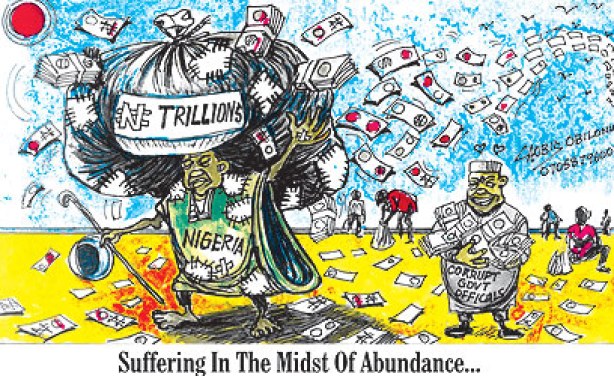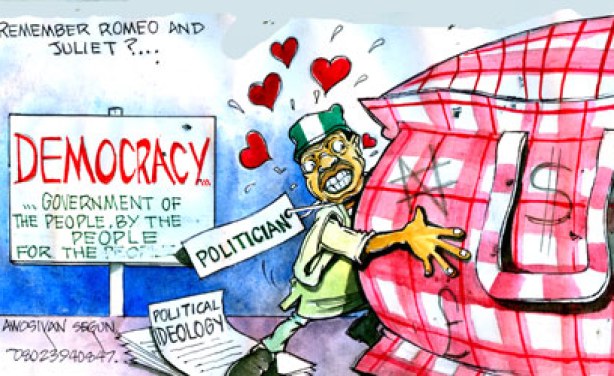Since the beginning of the ongoing uninterrupted democratic dispensation in 1999, Nigeria has recorded hundreds of individuals who have violated or betrayed their oath of office. Many of those given the opportunity or privilege and trusted to handle the collective public treasury have compromised the public trust given to them.

Nigeria is said to be the largest country in Africa; located in the western part of the continent with the largest economy; hence it is tagged, “the giant of Africa.” The country is currently holding the 27th position in the world economic rank in terms of nominal Gross Domestic Product (GDP).

According to the statistics, a total GDP amounted to $514.05 billion in 2021. Nigeria has been the largest economy for over thirty years on the African continent. But the question is: How has this lucrative and mouthwatering economy impacted positively on the lives of Nigerians, particularly the masses?
In 2018, it was reported that about 70, 677, 758 Nigerians (representing 33% of the total population) are living in extreme poverty. The poverty rate stood at 92.00% in the same year.
Surprisingly, the standard of living in Nigeria (the acclaimed giant of Africa) is ranked 17th in the continent despite its economic values. This is directly contrary to the economic buoyancy of the country. According to the Nairametrics analyses, the countries such as Seychelles, Mauritius, Equatorial Guinea, Gabon, Botswana, South Africa and others are ahead of Nigeria in the performance of the economy and its positive impact on the lives of the citizens. In essence, Nigeria’s economic giant in Africa is more of paper talk than feasible.
The living standard indicators, such as income, employment opportunities, cost of goods and services, poverty, life expectancy, etc, revealed that the majority of Nigerians have low living standards in both urban and rural areas across the six geopolitical zones of the country. Because of the corruption perceptions, the country is said to be in the bottom half of most African countries in terms of happiness; a phenomenon contrary to the economic stance of the country.
However, this shouldn’t be a surprise to any reasonable Nigerian considering the fact that individuals that are entrusted with public funds are diverting the funds amounting to billions of dollars into their personal pocket. Many Nigerian political leaders and public figures have one or two corruption cases to answer as a result of their corrupt practices in delivering the public service.
Since the beginning of the ongoing uninterrupted democratic dispensation in 1999, Nigeria has recorded hundreds of individuals who have violated or betrayed their oath of office. Many of those given the opportunity or privilege and trusted to handle the collective public treasury have compromised the public trust given to them.
Great number of elected governors, appointed Ministers, Commissioners, Accountants General of the Federation, Auditors, Permanent Secretaries, Directors and Officers of ministries and parastatals in Nigeria have love for their own pockets than the love of the country and the well-being of the citizens. They have a damn sight unpatriotic attitude that is greatly unpardonable. Imagine a single individual stealing about N200 billion while in office as an accountant general of the Federation. This is a tip of the iceberg from the hundreds of people who are given such a privilege to serve the country but destroyed it selfishly.
Now, tell me why Nigerians should not be suffering from abject poverty, when a very few people are diverting the funds into their personal pockets. The embezzlement or stealing of public funds has become an infection on the lives of (almost all) Nigerians who have the privilege to serve the country; probably because there’s no heavy penalty to be melted on the indicted culprits constitutionally.
As such, it is my candid opinion and suggestion that death penalty should be constitutionalized in Nigeria against those found guilty of stealing from the national treasury. This way, the mentality of taking the ‘share of national cake’ will be minimized, if not totally killed. The legislature should legislate a law to bring this into the constitution.
Most at times, people tend to have a rethink to do bad when they know the devastated consequences that will follow their corrupt practices. Therefore, if Nigeria really wants to kill corruption that is eating deep into the system, there is dire need to kill some Nigerians who are bad elements and causing havoc to the nation’s economy and ultimately, causing misery in the lives of ordinary citizens.
Mohammed Aliyu Baba
aliyu0380@gmail.com



















